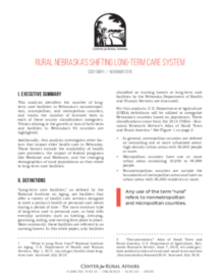For rural residents, lack of access to long-term care is exacerbated by severe shortages of providers and the financial stresses of staffing qualified, consistent employees. At differing levels, 68.8 percent of Nebraska’s counties are facing a shortage of primary care providers – leaving rural Nebraskans with limited access to preventative and long-term health care.
Medicaid, Medicare, and private insurance, even when combined, are often not enough for patients to cover their long-term care expenses. This creates immense, often unsurmountable, financial pressure for many facilities, especially those in rural areas that tend to rely more heavily on federal programs. Furthermore, many Nebraskans who need long-term care cannot afford private health insurance. This leaves them unable to cover their accrued expenses, and facilities have to deal with the consequences.
Medicaid shortfalls for long-term care facilities have grown over the last several years, leaving gaps in profit margins for facilities that provide care for a large share of Medicaid beneficiaries. Rural facilities tend to rely on Medicaid more heavily than their urban counterparts. Low reimbursement rates force many long-term care providers to operate at a loss from the start, to deny patients access to needed care based on their ability to pay, or to close their doors altogether.
Every day, Nebraskans are making tough decisions about long-term health care – crucial services that they, or their loved ones, need to survive. For rural residents, this decision is increasingly pushed out of their hands. There is no substitute for strong leadership and innovative policy solutions in this area; Nebraskans deserve access to quality long-term health care regardless of where they live.


